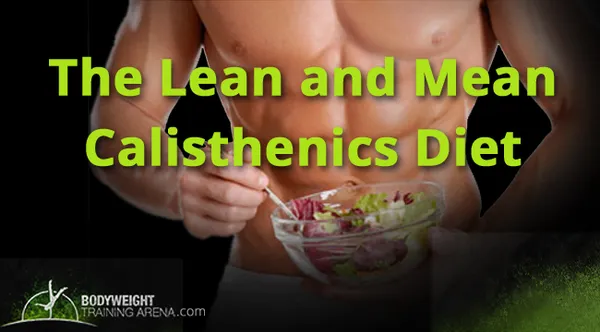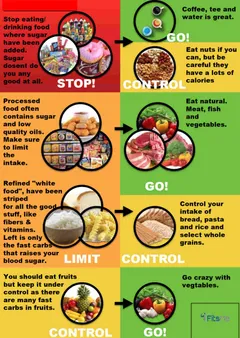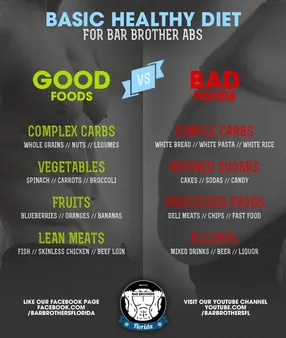Table of Contents
Calisthenics is a great way to get in shape, but it's important to fuel your body with the right nutrients to support your training. A healthy diet for calisthenics should be rich in protein, carbohydrates, and healthy fats. It should also include plenty of fruits, vegetables, and whole grains. By following a healthy diet, you can maximize your results from calisthenics and achieve your fitness goals. For more information on diet and calisthenics, visit our website at Kizworld.com.
The Ultimate Diet for Calisthenics: Fuel Your Body for Success
Nutrient | Importance | Sources |
|---|---|---|
Protein | Builds and repairs muscle tissue | Lean meats, poultry, fish, beans, lentils |
Carbohydrates | Provides energy for workouts | Whole grains, fruits, vegetables |
Fats | Supports hormone production and cell function | Nuts, seeds, avocados, olive oil |
Vitamins and Minerals | Essential for overall health and performance | Fruits, vegetables, fortified foods |
Water | Regulates body temperature and prevents dehydration | Drink plenty of water throughout the day |
I. Calisthenics Diet: Macronutrient Breakdown
Protein
Protein is an essential macronutrient for calisthenics athletes. It helps to build and repair muscle tissue, which is necessary for strength and power. Good sources of protein include lean meats, poultry, fish, beans, and lentils. Aim to consume around 1.6-2.2 grams of protein per kilogram of body weight each day.
Here are some tips for getting enough protein in your diet:
- Eat a variety of protein sources throughout the day.
- Include protein in every meal and snack.
- Consider adding a protein supplement to your diet if you're struggling to get enough from food alone.
Carbohydrates
Carbohydrates are another important macronutrient for calisthenics athletes. They provide energy for workouts and help to improve endurance. Good sources of carbohydrates include whole grains, fruits, and vegetables. Aim to consume around 4-6 grams of carbohydrates per kilogram of body weight each day.
Here are some tips for getting enough carbohydrates in your diet:
- Eat a variety of carbohydrate sources throughout the day.
- Choose whole grains over refined grains.
- Include fruits and vegetables in every meal and snack.
Fats
Fats are an essential macronutrient for overall health and performance. They support hormone production and cell function. Good sources of fats include nuts, seeds, avocados, and olive oil. Aim to consume around 1-1.2 grams of fat per kilogram of body weight each day.
Here are some tips for getting enough fats in your diet:
- Eat a variety of fat sources throughout the day.
- Choose healthy fats over unhealthy fats.
- Include fats in every meal and snack.
Nutrient | Importance | Sources |
|---|---|---|
Protein | Builds and repairs muscle tissue | Lean meats, poultry, fish, beans, lentils |
Carbohydrates | Provides energy for workouts | Whole grains, fruits, vegetables |
Fats | Supports hormone production and cell function | Nuts, seeds, avocados, olive oil |
By following these tips, you can ensure that you're getting the nutrients you need to fuel your calisthenics workouts and reach your fitness goals.
For more information on calisthenics nutrition, check out our related posts on the best calisthenics supplements and how to design your own calisthenics routine.
Calisthenics Diet: Macronutrient Breakdown
II. Essential Nutrients for Calisthenics
Macronutrients
Macronutrients are the building blocks of a healthy diet and are essential for calisthenics athletes. They provide the body with the energy and nutrients it needs to perform at its best. The three main macronutrients are carbohydrates, protein, and fat.
Carbohydrates are the body's primary source of energy. They are broken down into glucose, which is then used by the muscles for fuel. Complex carbohydrates, such as those found in whole grains, fruits, and vegetables, are slowly digested and provide sustained energy throughout the day. Simple carbohydrates, such as those found in sugary drinks and processed foods, are quickly digested and can lead to spikes in blood sugar levels.
Protein is essential for building and repairing muscle tissue. It is also involved in a variety of other bodily functions, such as hormone production and immune function. Good sources of protein include lean meats, poultry, fish, beans, and lentils.
Fat is essential for hormone production and cell function. It also helps the body absorb vitamins and minerals. Healthy sources of fat include nuts, seeds, avocados, and olive oil.
Micronutrients
Micronutrients are vitamins and minerals that are essential for overall health and performance. They are involved in a variety of bodily functions, such as energy production, immune function, and bone health. Good sources of micronutrients include fruits, vegetables, and fortified foods.
Water is essential for regulating body temperature and preventing dehydration. It is important to drink plenty of water throughout the day, especially before, during, and after workouts.
Nutrient | Importance | Sources |
|---|---|---|
Protein | Builds and repairs muscle tissue | Lean meats, poultry, fish, beans, lentils |
Carbohydrates | Provides energy for workouts | Whole grains, fruits, vegetables |
Fats | Supports hormone production and cell function | Nuts, seeds, avocados, olive oil |
Vitamins and Minerals | Essential for overall health and performance | Fruits, vegetables, fortified foods |
Water | Regulates body temperature and prevents dehydration | Drink plenty of water throughout the day |
By following a healthy diet that is rich in essential nutrients, calisthenics athletes can improve their performance and recovery, and reduce their risk of injury.
Here are some additional tips for eating a healthy diet for calisthenics:
- Eat regular meals and snacks throughout the day to avoid getting too hungry or too full.
- Choose nutrient-rich foods over processed foods.
- Hydrate well by drinking plenty of water throughout the day.
- Listen to your body and eat when you're hungry, but stop when you're full.
- Make gradual changes to your diet over time to avoid feeling overwhelmed.
By following these tips, you can improve your diet and fuel your calisthenics training.
Related posts:
- The Best Calisthenics Supplements and Nutrition
- How to Get Started with Calisthenics as a Beginner
- The Best Calisthenics Exercises and Variations
Essential Nutrients for Calisthenics
III. Hydration for Calisthenics
Staying hydrated is crucial for calisthenics athletes. Water helps regulate body temperature, lubricate joints, and transport nutrients to muscles. Dehydration can lead to fatigue, muscle cramps, and decreased performance. Aim to drink plenty of water throughout the day, especially before, during, and after workouts.
In addition to water, you can also consume sports drinks or electrolyte-rich beverages to replenish lost electrolytes during intense workouts. However, it's important to note that sugary sports drinks should be consumed in moderation, as they can contribute to weight gain and other health problems.
Signs of Dehydration | Symptoms |
|---|---|
Mild Dehydration | Thirst, dry mouth, fatigue |
Moderate Dehydration | Headache, dizziness, muscle cramps |
Severe Dehydration | Confusion, seizures, unconsciousness |
Here are some tips for staying hydrated during calisthenics workouts:
- Drink plenty of water throughout the day, even if you don't feel thirsty.
- Carry a water bottle with you to workouts and sip on it regularly.
- Consume sports drinks or electrolyte-rich beverages during intense workouts.
- Avoid sugary drinks, as they can contribute to dehydration.
- Listen to your body and take breaks when you need to drink water.
By following these tips, you can stay hydrated and perform at your best during calisthenics workouts.
Related posts:
Hydration for Calisthenics
IV. Sample Calisthenics Diet Plan
A well-rounded diet is crucial for supporting your calisthenics training. Here's a sample plan that provides the essential nutrients for optimal performance:
Meal | Menu |
|---|---|
Breakfast | Oatmeal with berries and nuts |
Lunch | Grilled chicken salad with quinoa |
Dinner | Salmon with roasted vegetables and brown rice |
Snacks | Fruits, vegetables, yogurt |
Remember, individual nutritional needs vary. Consult a registered dietitian for personalized advice.
Sample Calisthenics Diet Plan
V. Conclusion
In this article, we have discussed the importance of a healthy diet for calisthenics athletes. We have provided a sample diet plan that can help you fuel your workouts and recover properly. We have also discussed the importance of hydration, rest, and supplementation. By following the advice in this article, you can improve your performance and reach your fitness goals.
Remember, a healthy diet is just one part of a healthy lifestyle. Make sure to get regular exercise, get enough sleep, and manage stress levels. By taking care of your overall health, you can improve your performance in calisthenics and enjoy a better quality of life.